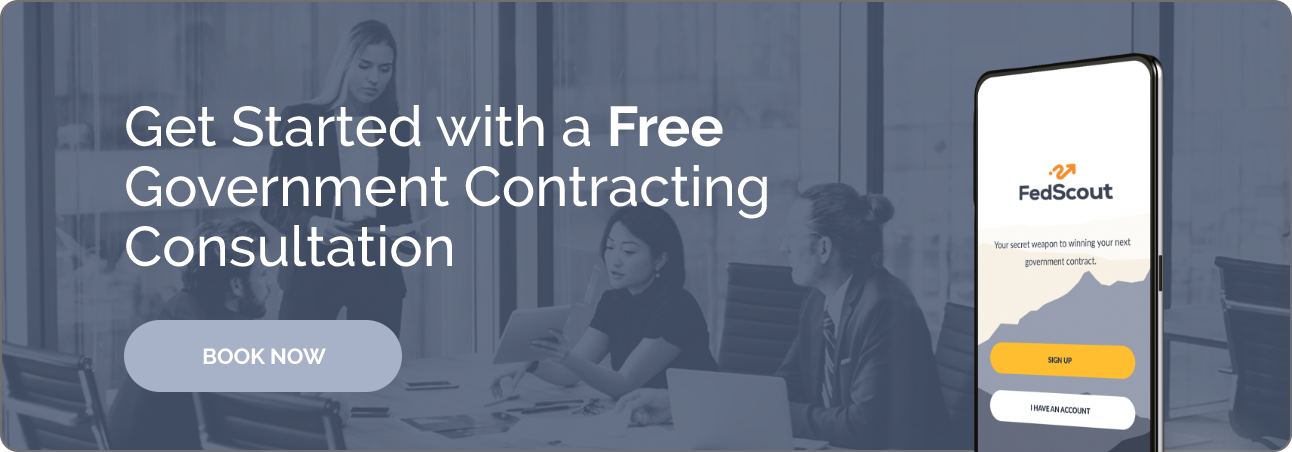Time to read: 13 min
It’s easy for new companies to feel defeated after losing a government contract that they put a lot of effort into. But there can be value just from pursuing an opportunity, even if you lose. For example, whether you win or lose if you pursue an RFP, assemble a team, and build a solid cost and technical proposal you will walk away with a deeper understanding of your rates, a refined selling proposition, an enhanced proposal library that will make every future proposal easier to build, and stronger relationships with future customers and collaborators.
When deciding to pursue an opportunity, consider your team’s calendar and current workload, and the effort required to draft a proposal. If your only intent when pursuing a contract is to win it, then your chances of finding the process worthwhile are low; if you look for benefits from the process itself, beyond winning the contract, then you're more likely to take good things away with you, whether or not your bid is a winner. Shift your team’s mindset so you can benefit from bidding, even if you do not win the contract.
Define Success For This Pursuit
Before deciding whether to pursue an opportunity, determine what success looks like for your business. Here are the important factors to consider when defining “success”:
- Winning the contract
- Connecting with prime contractors
- Building relationships with the customer for future opportunities
- Learning the GovCon process and business development
- Practicing proposal writing
- Building stock proposal content
- Setting your pricing (rates, G&A, indirects, and more)
If winning a contract is your only measure of success, your chances of succeeding are around 15 percent. But for new businesses, building trusting relationships is arguably the most important thing for future endeavors – and with some solid planning, you can achieve a 100 percent success rate in relationship building.
Score Your Success with Specific Goals
Companies should evaluate themselves with a self-score card. Give your team measurable KPI goals to help assess whether or not your proposal was successful. Those goals should be informed by the following four points, in which companies need to be competent before they can win government contracts:
- Know your capabilities.
- Build a trust-based relationship with the government customer.
- Build a team of trusted collaborators with whom you have a good relationship.
- Stay current on administrative and technical subject matter.
Know Your Strengths
Before pursuing your first contract, your team should be able to clearly describe your products or services, and what differentiates you from your competitors. Be prepared with answers to any questions about how your company operates, what you do, and why you are the best team to complete the work. You can practice reciting your strengths by completing a number of tasks:
- writing a proposal;
- putting together a capabilities statement;
- testing elevator pitches at trade association meetings
Build a Trust-Based Relationship with the Government Customer
Pursuing a contract is about more than just winning. Your proposal may be your first introduction to the government customer. Making a memorable impression will keep your company top of mind when the next bid opportunity rolls around.
Build Trust-Based Relationships with Potential Collaborators
Network with industry veterans who can help you succeed on your next bid. Use your proposal as a way to connect with potential teaming partners. By building a solid foundation with collaborators, you can work together seamlessly on the next project.
Stay Current with Administrative and Technical Subject Matter Knowledge
Industry rules and regulations are constantly changing. Being an expert in technical subject matter can help your company stay flexible and adapt to shifting demands. Implement regular training to make sure your team is ready to work whenever an opportunity arises.
Ways to Define Whether a Contract Bid Has Been Successful
Depending on your definition of success, here are some questions to help you decide whether this contract could be a success for you:
Win the Contract
Figuring out your chances of winning (P-Win) is complicated, and we offer deep dives into each of these topics – but the key questions are:
- Why should the government choose you over everyone else?
- Does the customer know you?
- What makes your product or service better than others?
- Do you know much about this contract? Did you respond to the RFI? Do you know anything about previous similar contracts?
- Do you know whether there is a vendor already providing this service?
- Do you know what the customer thinks of the current vendor?
Connect with Primes
- Do you know a prime that is open to working with you?
- What do you bring to the prime that is so valuable that they would work with you?
- Is there enough time to negotiate a teaming agreement with the prime?
- Would you want to work with this prime again?
Connect with the Customer
- Would you want to work with this customer again?
- Do you have time to engage the customer before the award (e.g. ask questions, hold an office meeting, or attend an industry day)?
- Would the customer meet with you post-award, even if you lose the bid?
Learn the GovCon Process and Build Your Library
- Do you have a mentor who will help you learn the processes, review your proposal sections, or help you with pricing?
- Will the materials you build for this proposal help you on other projects?
- Proposal text
- Resume write-ups
- Personnel pricing backups
- Rate development
Calculate the Time Needed for Success
The time required to prepare varies, depending on your measures of success. Here are some good rules to follow when planning a proposal timeline:
Winning the Contract
If you are going after the contract alone, we recommend that you:
- review the contract thoroughly;
- assess the work required to create a proposal, and decide whether your team has enough capacity to build it by the due date.
If you want to team with another company that you know but have not worked with in the past, you need to subtract two weeks from your available time. This is due to time that will be lost to teaming admin.
Connect with Primes
If you know the prime but have never worked with them, then you will likely need 30 days to team up and write the proposal. Make sure to check the time remaining on the proposal.
- Find the prime before the RFI or forecasted opportunity comes out.
- Don’t try to find and engage a prime if the RFP is already out.
Connect with the Customer
- If the RFP is out, the government has to be careful about engaging with you.
- RFIs and post-award engagement are much easier.
Learn the GovCon Process and Build Your Library
There is no set window for learning, but if you want a prime to coach you, they will be most interested when you are collaborating on a proposal.
Helpful Tips for the Contract Proposal Process
When pursuing a bid opportunity, be thoughtful and purposeful with your actions. Here are some ways you can incorporate these elements into your proposal process:
- Refine your content
- Make a memorable impression
- Audit your business infrastructure
- Practice your pitch to partners
- Determine your operational strengths
Refine Your Content
When you have a page limit imposed on listing your capabilities, you are forced to condense and filter your skills down to what’s important. Be precise.
Make a Memorable Impression
Building a healthy, trusting relationship with government customers will bring long-term benefits. Ask yourself what the customer will remember you by. Even a losing bid can translate into success if you get a meaningful and insightful debrief from the customer, as required by government regulations.
Ten hours of drafting a proposal to build strong customer relationships is more valuable than ten hours of marketing or networking on Linkedin.
Audit Your Business Infrastructure
Before you can build relationships with other contractors, you need to make sure your team has the proper infrastructure in place. Aim to build at least one good contact with a potential collaborator per proposal. Plan out your operations and decide whether your team can realistically take on more work. Avoid embarrassment by putting your best foot forward.
Practice Your Pitch to Primes
Prime contractors may not see value in collaborating with you. Talk to your team to find a compelling advantage that you bring to the table. Create a value proposition that they simply can’t refuse.
Determine Your Operational Strengths
Working closely with a prime contractor means letting them see the inside and outside of your operations. Avoid embarrassing yourself by ensuring your team is prepared for criticism. Your partner may avoid working with you in the future if you do not perform well in this respect.
Build Your Administrative Toolkit
When pursuing a contract, think about how you can build out your administrative side. Learn about industry compliance, rules, and regulations that you would have otherwise had no time to investigate. Writing a proposal with strict requirements will force you to learn about forcing functions before its due date.
- Learn from collaborating with your prime.
- Refresh your knowledge on forcing functions.
- Find professional service providers.
Professional service providers can advance your team’s ability to draft a proposal. Reach out to professionals with expertise to save time when bidding. For example, hiring an accountant is a smart choice, as they can help you set up your rates and accurately calculate your overhead costs, G&A costs, and fringe benefits.
Setting your pricing rates in the competitive GovCon market is a challenge. Before you submit a bid, decide what your team’s rates are. For example, your project manager’s time may have a different value from your lead developer’s time when it comes to invoicing the customer. Double-check that all your administrative details are finalized before bidding on an important assignment.
How Contract Proposals Can Promote Business Development
Find a contract that is relevant enough to you and contains your industry specialties. Submit your bid with no expectation of winning, but rather with a view to benefiting from a business development perspective. While winning a government contract is great, shifting your paradigm will help your team grow even after a loss. This alternative framework to a P-win analysis is helpful for small or new companies. Calculating your P-win requires a lot of information and data that new contractors do not have.
Be deliberate in your bidding. Many new companies jump at exciting opportunities without properly evaluating their own infrastructure or operational capacity. Remember the five steps to building a highly successful government contract proposal:
- Assess your company
- Conduct market research
- Identify your customer
- Identify primes
- Identify how you can fulfill the customer’s needs and what value you bring to the market
Make Your Go or No-Go Decisions
Remember, the government puts out about 1,000 new contracts on SAM.gov everyday. Don’t get worried if you have to pass on a great RFP. You can learn a lot even from an RFP on which you pass that will set you up for success with the next one.
Next Steps
Assuming you are going to go for this opportunity, we suggest diving deeper to get ready to build your team and proposal:
- Build your work plan.
- Plan your team-building strategy.
- Know your customer engagement strategy.
- Analyze RFPs.
- Practice proposal writing.



